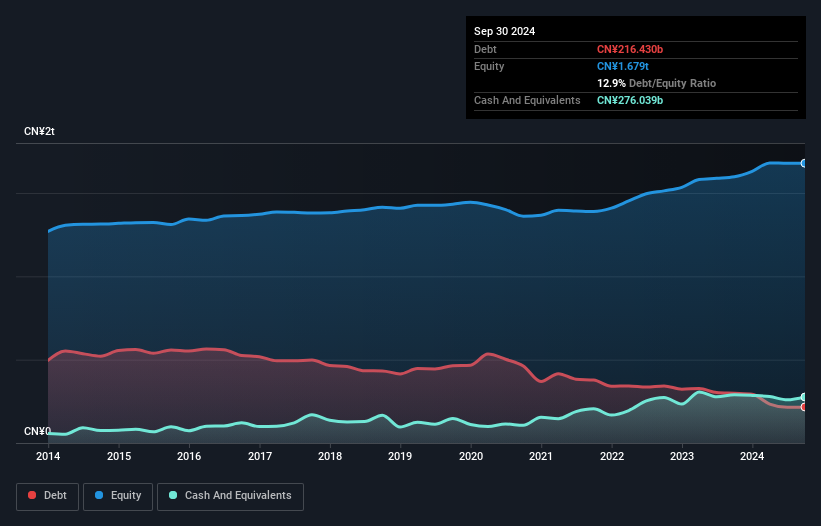
The external fund manager backed by Berkshire Hathaway's Charlie Munger, Li Lu, makes no bones about it when he says 'The biggest investment risk is not the volatility of prices, but whether you will suffer a permanent loss of capital.' So it might be obvious that you need to consider debt, when you think about how risky any given stock is, because too much debt can sink a company. Importantly, PetroChina Company Limited (HKG:857) does carry debt. But the real question is whether this debt is making the company risky.
What Risk Does Debt Bring?
Debt and other liabilities become risky for a business when it cannot easily fulfill those obligations, either with free cash flow or by raising capital at an attractive price. If things get really bad, the lenders can take control of the business. While that is not too common, we often do see indebted companies permanently diluting shareholders because lenders force them to raise capital at a distressed price. Of course, the upside of debt is that it often represents cheap capital, especially when it replaces dilution in a company with the ability to reinvest at high rates of return. When we examine debt levels, we first consider both cash and debt levels, together.
Check out our latest analysis for PetroChina
What Is PetroChina's Net Debt?
As you can see below, PetroChina had CN¥216.4b of debt at September 2024, down from CN¥297.9b a year prior. However, it does have CN¥276.0b in cash offsetting this, leading to net cash of CN¥59.6b.

A Look At PetroChina's Liabilities
The latest balance sheet data shows that PetroChina had liabilities of CN¥715.3b due within a year, and liabilities of CN¥382.6b falling due after that. Offsetting these obligations, it had cash of CN¥276.0b as well as receivables valued at CN¥94.6b due within 12 months. So it has liabilities totalling CN¥727.3b more than its cash and near-term receivables, combined.
While this might seem like a lot, it is not so bad since PetroChina has a huge market capitalization of CN¥1.41t, and so it could probably strengthen its balance sheet by raising capital if it needed to. However, it is still worthwhile taking a close look at its ability to pay off debt. Despite its noteworthy liabilities, PetroChina boasts net cash, so it's fair to say it does not have a heavy debt load!
On the other hand, PetroChina saw its EBIT drop by 2.2% in the last twelve months. That sort of decline, if sustained, will obviously make debt harder to handle. The balance sheet is clearly the area to focus on when you are analysing debt. But ultimately the future profitability of the business will decide if PetroChina can strengthen its balance sheet over time. So if you're focused on the future you can check out this free report showing analyst profit forecasts.
Finally, while the tax-man may adore accounting profits, lenders only accept cold hard cash. While PetroChina has net cash on its balance sheet, it's still worth taking a look at its ability to convert earnings before interest and tax (EBIT) to free cash flow, to help us understand how quickly it is building (or eroding) that cash balance. Over the most recent three years, PetroChina recorded free cash flow worth 68% of its EBIT, which is around normal, given free cash flow excludes interest and tax. This free cash flow puts the company in a good position to pay down debt, when appropriate.
Summing Up
Although PetroChina's balance sheet isn't particularly strong, due to the total liabilities, it is clearly positive to see that it has net cash of CN¥59.6b. The cherry on top was that in converted 68% of that EBIT to free cash flow, bringing in CN¥157b. So we don't have any problem with PetroChina's use of debt. The balance sheet is clearly the area to focus on when you are analysing debt. But ultimately, every company can contain risks that exist outside of the balance sheet. Be aware that PetroChina is showing 2 warning signs in our investment analysis , and 1 of those is a bit concerning...
Of course, if you're the type of investor who prefers buying stocks without the burden of debt, then don't hesitate to discover our exclusive list of net cash growth stocks, today.
New: Manage All Your Stock Portfolios in One Place
We've created the ultimate portfolio companion for stock investors, and it's free.
• Connect an unlimited number of Portfolios and see your total in one currency
• Be alerted to new Warning Signs or Risks via email or mobile
• Track the Fair Value of your stocks
Have feedback on this article? Concerned about the content? Get in touch with us directly. Alternatively, email editorial-team (at) simplywallst.com.
This article by Simply Wall St is general in nature. We provide commentary based on historical data and analyst forecasts only using an unbiased methodology and our articles are not intended to be financial advice. It does not constitute a recommendation to buy or sell any stock, and does not take account of your objectives, or your financial situation. We aim to bring you long-term focused analysis driven by fundamental data. Note that our analysis may not factor in the latest price-sensitive company announcements or qualitative material. Simply Wall St has no position in any stocks mentioned.
About SEHK:857
PetroChina
Engages in a range of petroleum related products, services, and activities in Mainland China and internationally.
Undervalued with excellent balance sheet and pays a dividend.
Similar Companies
Market Insights
Community Narratives



